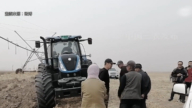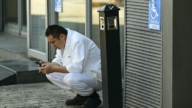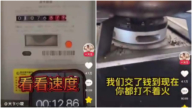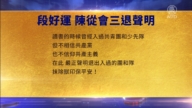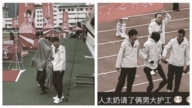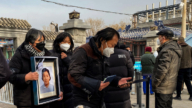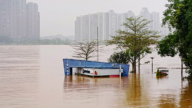【新唐人2014年02月27日讯】近期,中国大陆超过十分之一国土笼罩在严重雾霾下,其中以北京、天津、河北省多个城市最为严重。面对严重超标的空气污染指数,河北石家庄居民李贵欣做出了一项惊人创举:他状告石家庄环保局失职,并要求损害赔偿1万元人民币。
从20号开始,河北省大部分地区已连续7天出现雾霾。22号下午,河北省气象台发布首个霾橙色预警信号,截至25号下午5点,共发布了10次霾橙色预警信号。
中共环保部通报说,截至24号,实施空气质量新标准监测的161个城市中,有57个城市达重度及以上污染,其中15个城市是严重污染。
据大陆《中新社》报导,大陆10%国土持续重霾,不少地方PM2.5指数超过500,而国际卫生组织认为的安全指数则小于10。另据中共国家气象中心的数据,25号早晨,北京的PM2.5指数为444。
“中国法学会法理学研究会”顾问郭道晖:“北京的雾霾就是长期积累的问题爆发了,那是我们过于偏重于GDP去发展,而不顾生态环境受到破坏,那是领导决策的失误。在治理上,刚开始也是不太重视。最近这几天倒是发出了所谓橙色的警告。”
“四川大学环境科学与工程研究所”所长艾南山:“不是短期内可以解决的。北京本身,很多工业、企业已经迁走了,但是河北省工业区很多,好多烟囱在吹,好多炼钢、炼铁的,所以现在的雾霾比较严重,都是周围的东西成片的污染。”
19号上午,河北省石家庄市新华区居民李贵欣拿着一份行政诉状,先后到省高院、石家庄市中院申请立案,但都未被受理。
诉状中的被告是石家庄市环境保护局,李贵欣不仅要被告依法履行治理大气污染的职责,他还就大气污染对他造成的损失,提出由被告支付1万元人民币的经济赔偿。
20号上午,石家庄空气质量指数达337,属严重污染,李贵欣再一次拿着行政诉状到法院申请立案,这一次,石家庄市裕华区人民法院接收了他的诉讼材料。七个工作日内将给予是否受理的答复。
大陆《燕赵都市报》报导说,李贵欣在提起诉讼之前,搜集了大量的资料,认真查阅了石家庄市环保局网站公布的数字,并根据数字统计出去年石家庄的平均污染指数为247,属于重度污染的数值范围。
李贵欣是第一个因雾霾天气,将政府职能部门告上法庭的中国公民。他在接受《燕赵都市报》采访时表示:损害已经发生,施害一方却无法确认,因此必须得找管理部门 — 环保局。而赔偿要求即使不被支持,打这个官司本身也是种胜利。他说,他的行为实际上是一种“唤醒”:唤醒民众的法律意识,维护自身权益﹔唤醒环境执法部门采取有力手段,让老百姓能呼吸上新鲜空气﹔同时也唤醒政府、和立法部门关注环境问题,大力治污。
艾南山:“当然是可以状告,环保局也要负责任,当然政府要负责任,其实,环保局负的责任不及发改委负的责任大。”
郭道晖:“宪法规定,公民有对政府机关,对政府工作人员违法违宪的事情,进行举报、控诉、申诉等权利。当然这个问题是不是环保局的问题,我看还不是,不完全是,这个应该中国人大做出决议,责成有关政府部门把这个问题好好研究、拨款治理。单单一个环保局,我看它也没有那么大的权力。”
大陆陷入长达一周的重度雾霾天气,正在大陆访问的瑞典外交大臣卡尔.比尔特25号在新浪微博上PO文说,“雾霾让人不舒服而且对身体有害。”美国《彭博社》则表示,从污染程度看,北京和周边山区城市张家口,已经丧失申办2022年冬奥的资格。
《彭博社》网站23号一篇题为“再见,索契残雪﹔你好,中国雾霾?”的报导指称,还有什么比索契这个满是棕榈树、没有雪的亚热带地区搞冬奥会更糟糕的事吗?或许那就是﹕在大陆污染最严重省份的山区内进行滑雪比赛,在干燥、雾霾笼罩的平原举办冬奥开幕式吧!
采访/常春 编辑/陈洁 后制/李勇
Man Sues Chinese Regime Over Air Pollution
Recently, more than 10 percent of Mainland China
has been shrouded by severe smog.
Several cities including Beijing, Tianjin, Hebei Province
are the worst.
Hebei resident Li Guixin is suing Shijiazhuang Environmental
Protection Bureau (EPB) regarding the severity of the foul air.
Li is also seeking 10,000 Yuan (US $1,633) compensation
from the bureau.
Since Feb. 20, most areas in Hebei Province have had
smoggy weather for seven consecutive days.
On Feb. 22, Hebei Meteorological Center
issued its first orange alert.
By 5:00 p.m. Beijing time on Feb. 25,
ten orange warnings had been issued.
The environmental ministry reported that by the end
of Feb. 24, among 161 monitored cities,
57 cities had been hit by heavy air pollution
and among them 15 cities were most severe.
China News Service reports that 10 percent of China
is continuously enveloped in heavy air pollution.
In many locales, the level of tiny particles, known as PM2.5,
reached over 500.
The World Health Organization recommends a safe level
of particles with a diameter of no more than 10.
The National Meteorological Center’s data shows that
Beijing’s PM2.5 reached 444 on the morning of Feb. 25.
Guo Daohui, China Law Society consultant: “Beijing smog
is caused by long-term accumulation of problems, which has
resulting in crisis.
The regime has been overly concentrated
on the so-called GDP development.
They ignored the environmental damaging,
a mistake by the leadership.
The regime wasn’t concerned about resolving
the pollution in the beginning.
Over the past few days, the regime has issued
the so-called orange alerts."
Ai Nanshan, director of the College of Architecture
and Environment at Sichuan University:
“It cannot be cured in a short time.
Many industries and enterprises have moved out of Beijing.
However, there are many industrial zones in Hebei.
Many chimneys are blowing and the steel and iron factories
are running, so the air pollution is severe over there.
The surrounding areas have gradually become polluted
little by little."
On the morning of Feb. 19, Li Guixin of Hebei went
to the provincial high court and Shijiazhuang Intermediate
Court to sue the local regime over the smog.
But the lawsuit wasn’t accepted.
Li sued the local EPB and requested them to perform
their duty of controlling air pollution according to the law.
He also requested compensation from the bureau
of 10,000 Yuan ($1,633) for his economic losses.
On Feb. 20, Shijiazhuang’s PM2.5 hit 337, which
is within the heavy pollution range.
Li again went to the court and requested to file a lawsuit.
Yuhua District People’s Court in Shijiazhuang City
accepted his complaint this time.
The court will decide whether it will hear the lawsuit
or not within seven days.
A local newspaper reported that before Li Guixin
submitted his complaint,
he researched the EPB’s data and collected
a large amount of information.
Using EPB’s data he calculated that the average PM2.5
in Shijiazhuang last year was 247.
This figure is within the heavy pollution range.
Li Guixin has become the first person in China
to sue the regime for failing to curb air pollution.
He told the local newspaper in an interview that damage
has occurred but the party cannot confirm the victims.
So he must talk to the EPB.
Even though it’s unlikely his compensation request will be
accepted, the lawsuit itself can still be considered a victory.
Li believes his acts are a kind of wake up call: to awaken
the citizens’ legal awareness, maintaining their rights;
to awaken the regime to implement a practical action plan
so that citizens have the chance to breathe fresh air;
meanwhile, to awaken the regime and law organs to show
concern over the environmental pollution in order
to vigorously solve the problems.
Ai Nanshan: “Certainly one can sue them, the EPB
should also take responsibility.
The regime should also take responsibility.
Actually, EPB’s responsibility is less than that
of the National Development and Reform Commission."
Guo Daohui: “The law says that a citizen has the right to
report, petition, and appeal if the governmental
organs and its staff break the law.
Is it the EPB’s duty? Not entirely.
The National People’s Congress should decide
and submit the issue to the governmental agencies
so that they can do some research and get the funds
to cut the pollution.
EPB alone doesn’t have a lot of power."
The severest smog in China has lasted for almost a week.
Carl Bildt, the Swedish foreign minister, is visiting China.
He posted a Sina Weibo update on Feb. 25 that said,
“Unpleasant and hazardous now."
Bloomberg suggests that regarding the degree of air pollution,
Beijing-Zhangjiakou is not capable of meeting the standard
to bid on the 2022 Winter Olympic Games.
BloombergView published an article on Feb. 23 titled
“Goodbye, Sochi Slush. Hello, China Smog?" which read,
What’s worse than a snowless, subtropical Winter Olympics
like the one that wrapped up in palm-tree-lined Sochi, Russia,
this weekend?
How about an opening ceremony on an arid, smog-choked
plain and skiing events in the mountains
of the most polluted province in all of China?”
Interview/Chang Chun Edit/Chen Jie Post-Production/Li Yong



